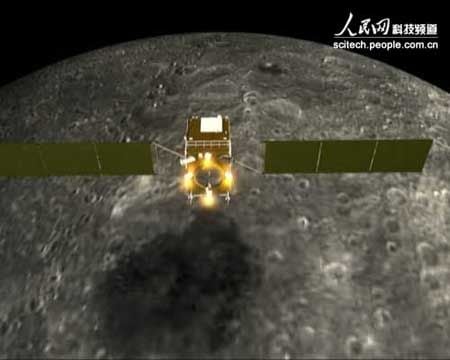
A Chinese artist's rendering of the Chang'e-1 probe headed to a successful crash landing on the Moon. Credit: Xinhua.
Today, Chinese authorties reported that the Chang’e-1 space probe made a successful and planned crash landing on the Moon. This is the first time any Chinese spacecraft has touched the Moon. China’s Xinhua state-controlled news service explains that the Chang’e probes are part of an extended mission aimed at eventually sending recoverable and manned missions to the Moon. Xinhua reports:
During the past 16 months, the lunar orbiter has sent back about 1400Gb of scientific data including pictures of the Moon, images of the lunar surface and maps of the distribution of elements on Moon. Ouyang Zhiyuan, chief scientist of China Lunar Exploration Project, said, “We set four major goals for this orbiting program. Through all of our scientists’ work, I think these goals were completed well. Some of the tasks were more than fulfilled.” Read more here.
The US sent a man to the Moon in 1969, 40 years ago. So what’s the big deal that China’s trying to do it now? For the US, it all boils down to national security. Space programs, while hailed in elementary schools for their scientific value, are an extension and symbol of national power. For years, the US and the USSR competed in a space race, experimenting with various satellite technology, missile defense systems and treating space as a territory to be fought over and disputed. Once the USSR fell, so did the amount of NASA programs and their visibility.
Recently, however, China has been making big strides in space. In early 2008, China shot down one of its own defunct satellites, proving that Beijing held a lot more military precision than previously thought. If it could shoot down its own satellite, it could just as easily destroy an American or Russian defense satellite, crippling missile shield capabilities. A very quick summary of the issues the US has with China’s space program can be found here.
China’s moon mission is perhaps more symbolic than strategic. One of the reasons NASA halted its moon programs was that besides the cost, they served no tangible strategic value. Perhaps Beijing has grand designs for the Moon, or perhaps it is taking this step to make a broad national statement. Whatever the case, Chinese space power is here to stay.